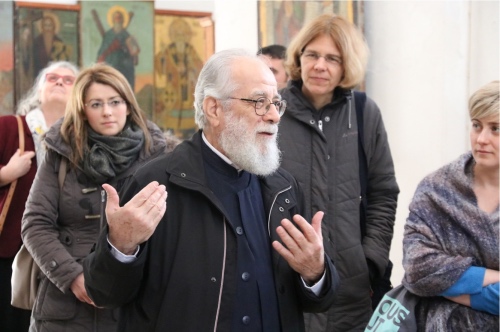Reconciliation in Cyprus is “not easy” yet it must be done “for the sake of unity”, a senior member of the Church of Cyprus has said.
In an interview with the World Council of Churches – representatives of which recently visited the Mediterreanean island, Metropolitan Dr Vasilios, referring to the Turkish invasion in 1974 which led to its partitioning with the northern third inhabited by Turkish Cypriots and the southern two-thirds by Greek Cypriots, said the healing of wounds was not “easy”.

Metropolitan Dr Vasilios speaking with representatives of the WCC in northern Cyprus. PICTURE: Marianne Ejdersten/WCC
“In any family in Cyprus, it is possible to find wounds caused during the Turkish invasion period,” he said. “We know people who have gone missing, we know people who were killed. I have lost five family members, including an uncle and cousins. Therefore, I must repeat that taking steps towards reconciliation is not easy. Yet we must do it…We must work towards reconciliation, peace and justice for the sake of unity of our country.”
Some 6,000 soldiers and civilians were killed during the 1974 invasion, more than 1,600 were recorded as missing and tens of thousands were displaced as a result of the subsequent division. A range of archaeological sites, monasteries, churches, cemeteries and monuments were also damaged during the conflict.
“These worship places are extremely precious to the people of faith, as their life events are marked in these places,” said Vasilios, noting that more than 500 churches in the northern occupied area are known to have been desecrated, along with sacred images, frescoes and mosaics.
Vasilios, the head of the diocese of Constantia-Ammochostos, said “real actions” were now needed to reach towards a political solution with the first step towards dissolving the border rebuilding relations among ordinary people. He said religious leaders played a role in helping to create an environment that promoted the unity of Cypriots.
Vasilios said that crossing the border into the northern area of the island now held by Turkey – where he spent his youth – remains hard.
“As bishop of the Church of Cyprus, I get to attend several church celebrations in Northern Cyprus. It is an extremely painful process for me being told this part of the island is not my home and that I need permission to enter,” he said.
In October last year, leaders from both sides of Cyprus agreed to open more checkpoints in the military frontier between the two parts of the island. The move comes after UN-led peace talks collapsed in July, 2017, reportedly after disagreement over the role Turkey would play on the island post-settlement. It has been reported in Turkey that no further negotiations on the issue are expected until the middle of this year.
Since 2011, Christian and Muslim leaders on the island have been working for unity on Cyprus under the umbrella of the Religious Track of the Cyprus Peace Process, which operates under the auspices of the Embassy of Sweden in Nicosia.





